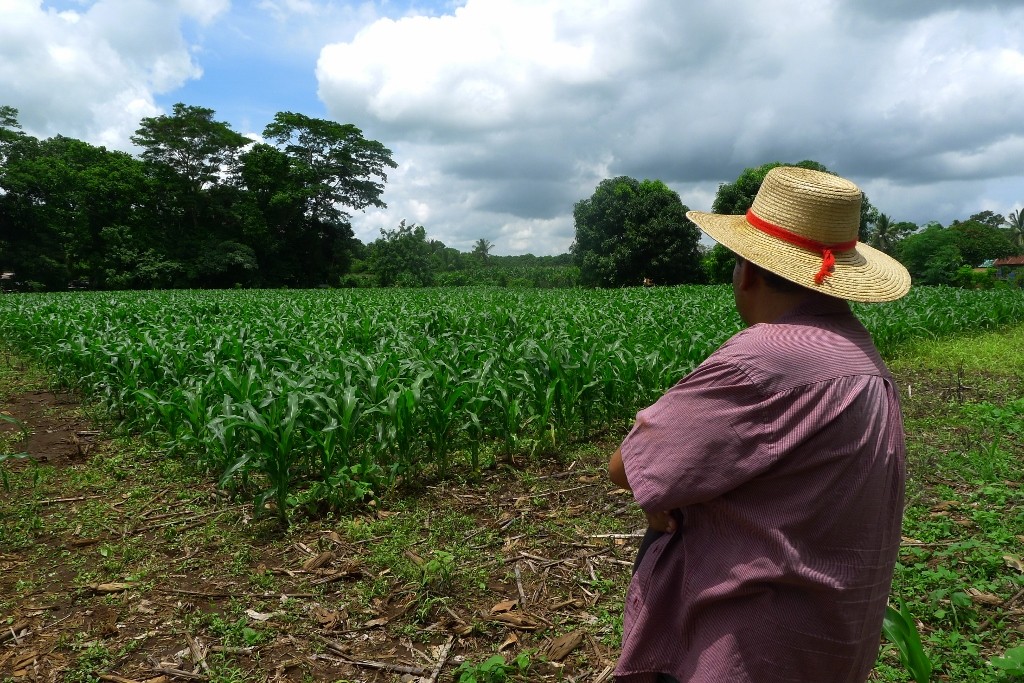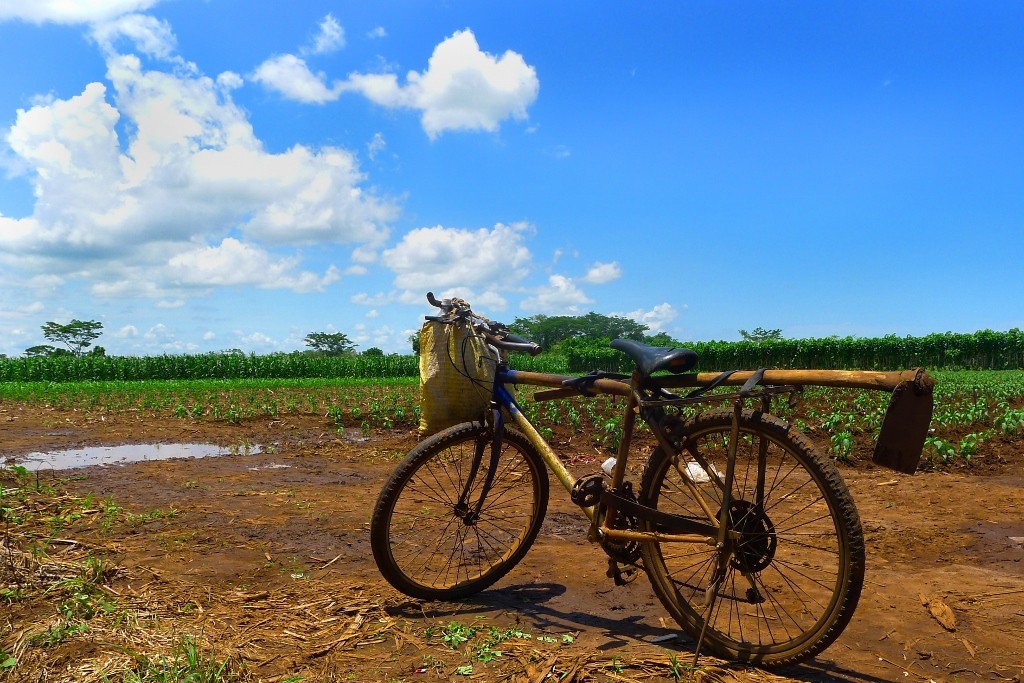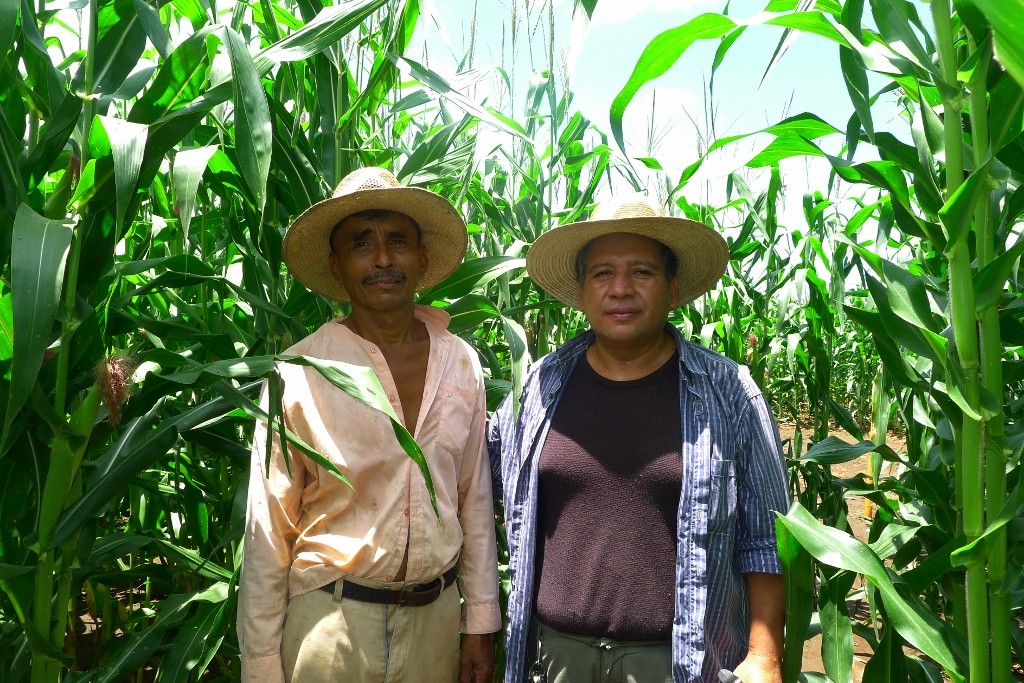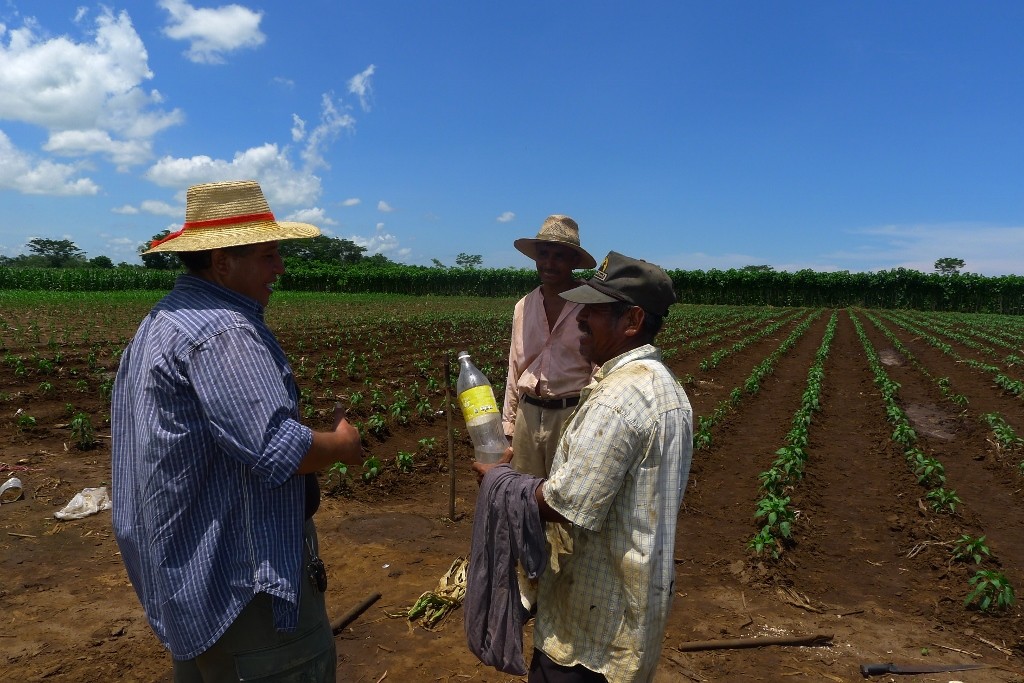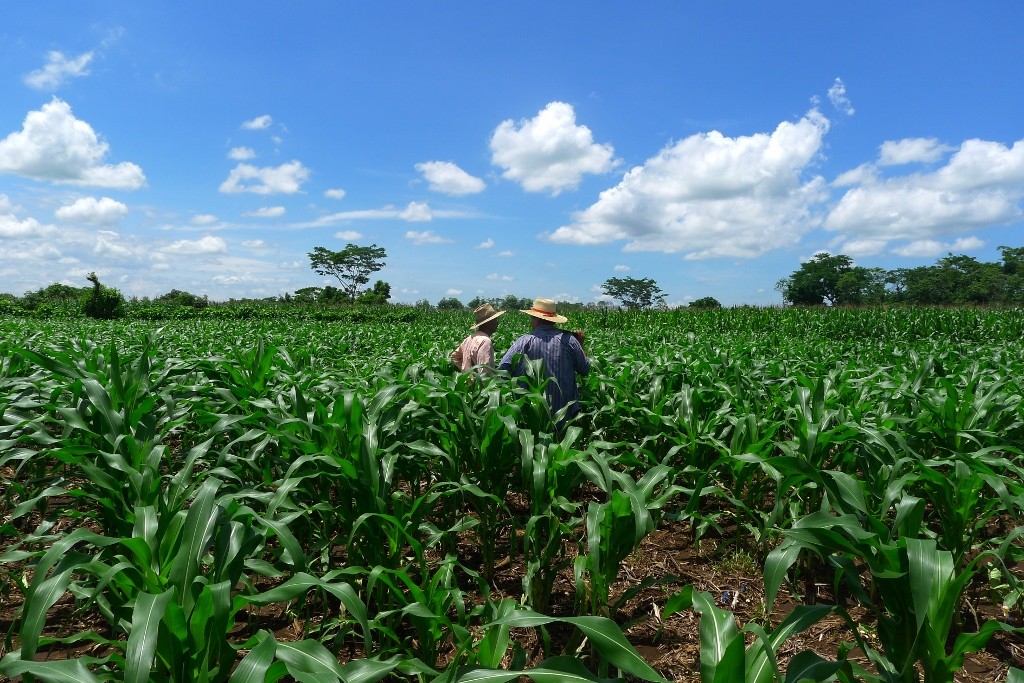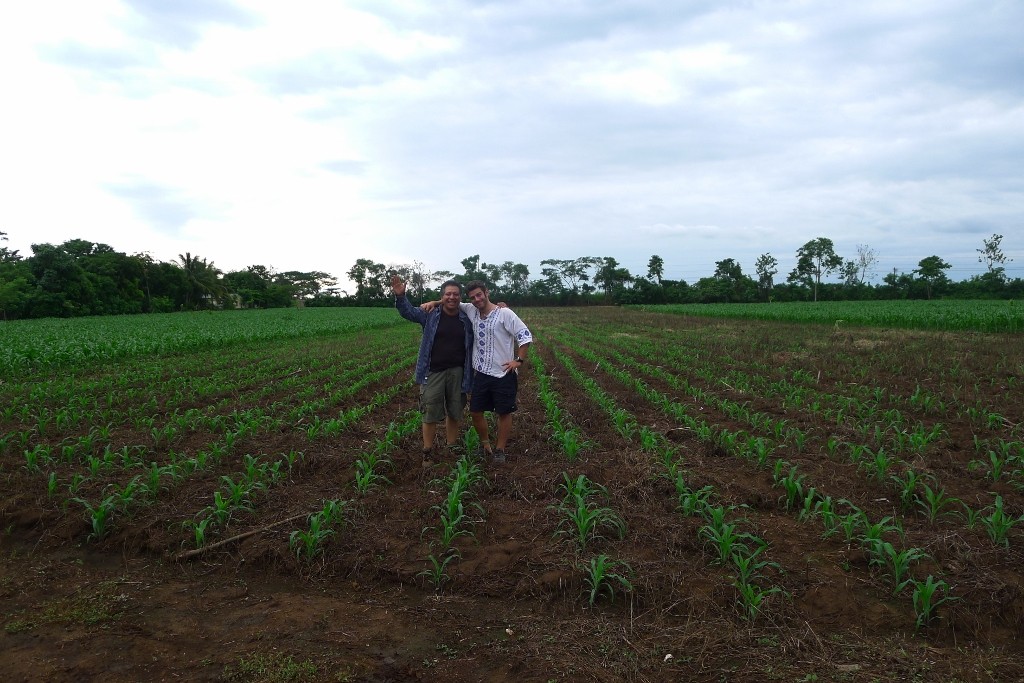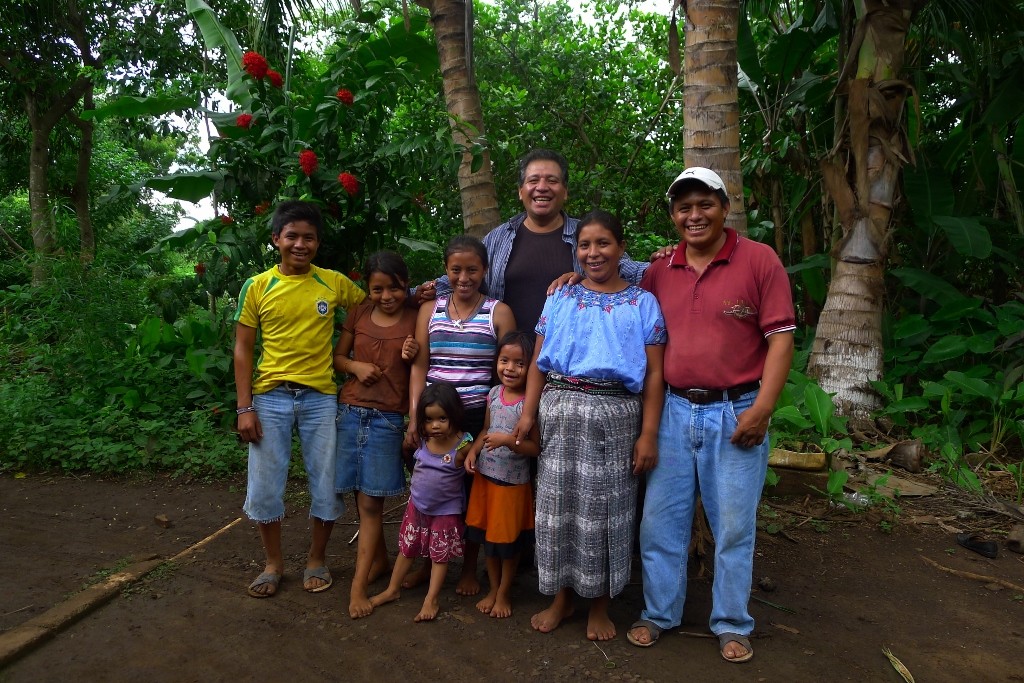Good things come to those who wait: as I was getting ready to leave, Curt from Semilla Nueva finally got in touch with me to give me the opportunity to meet the farmers his NGO works with. I was in Guatemala City battling with the pain of the inflammation in my hand, when I boarded a chicken bus to Ritalhuleu.
The insanity which is the chicken bus! There is a fine line between people and cargo in Guatemala. The bus rarely stops for long. The driver keeps moving while the “conductor” keeps packing people and cargo in – then runs after the bus to hop back on. Seats for two are filled with 3. The music blasts, the isles are impassible – how anyone ever manages to get off is a mystery. But for all the craziness, the bus will always stop to pick someone up or drop them off – no matter where.
After missing a connecting bus and spending a night in the middle of nowhere, I arrived it Reu and met and incredible person: Trinidad (Triny). He brought me back to his humble home to meet his family and to share breakfast before heading out to the farms along the pacific coast. Triny is the farmer liaison for Semilla Nueva and is one of the reasons the organization has made such an impact on the farming practices in Guatemala.
Triny’s work is neither simple nor easy. His job, along with Curt, is to introduce new and better farming techniques, and better seeds, to farmers who fight any change, no matter how reasonable, logical, or promising. Starvation and poverty are not motivators to change, rather they are reasons to never try anything new for fear of making a bad situation worse. But Semilla Nueva has not given up, and even though change is slow and hard to come by, and though its foundations are always a matter of the ebb and flow of resources, a difference has been made and its effects are growing every day.
It’s hard to change old, ingrained methods of farming. Even though they are bad, it’s what the farmers know and though it’s not perfect they get a steady and guaranteed result without the fear of a possible loss of crops (due to infestation, or any other reason they imagine may result from changing methods). And it is even harder when the reason some farmers give to continue slashing and burning is that they like to sow barefoot, and when you don’t burn the old stakes they are sharp on the feet; or that a field that is left unburned looks “dirty and unkempt” and that’s embarrassing in front of the neighbors.
Experimentation which at one point saved and catapulted Europe, is avoided here. Change, the inevitable engine of growth, is avoided. And the fact that the Maya declined because of over-population and land mismanagement, changes nothing for their modern descendants. The “poor” or “3rd world” mentality of considering only today – instant results from invested money and labor – stands in the way of rapid change. Which considering how many of the poor die, from war or starvation, it only makes sense to think of today – the day you know you are still alive.
When Triny was looking to communicate with farmers about improving techniques, he thought of which note would resonate with the farmers. Money, as always, was the right key. The #1 argument against change was the need to make money right away, and eliminating any possible risk, including trying new techniques which may hinder that. Triny gathered the farmers of a community together and piled up the old stalks and leaves of corn which they generally burned after harvest. He then lit the pile on fire – this is not out of the ordinary as that is what the farmers do anyway. He then took out $1 and threw it in the fire. People were a little taken aback but did not say much, he then took out $50 (about a week’s wages) and was about to throw it in the fire when the farmers really reacted. He said: it’s my money, I can do what I want with it. He then explained that when they burned the stalks of their crops (instead of letting them decompose) they were burning money. Allowing the stalks to decompose saves a good 30% of fertilizer cost. He did not talk about the benefits of decomposition, only about the fact that when they slash and burn they are burning up their own money.
Farmers who have tried the new methods (i.e. not slashing and burning their fields after harvest) for just one year have a glint of excitement in their eyes when speaking about the new method and the success they have seen. They in turn speak to other farmers about their experiences and enact change from within the community.
Though the effects may be subtle at first, the signs of continuing success and the absence of plagues (a major concern) breeds a tangible optimism. The approach is slow but intended for the long term. Convincing farmers to try new methods, take on risk with no security, is a hard sell, but the transition, via trial and error, is an organic one and is less likely to be rejected once adopted (there are multiple instances when NGO’s came to Guatemala, set up excellent systems for change and growth – all of which were dropped the second the NGO’s pulled out).
Many of the farmers Semilla Nueva works with left their homes from around Guatemala at the opportunity to start farms along the coast. The communities are tightly knit, maintain their (predominantly) native language of Mam, and vote democratically on most things involved in commununal life. They took one of the greatest risks they could by leaving their homes, so it is understandable that more risk may be unwelcome. And that is why Triny is so patient, why he works one on one with the farmers and utilizes new crops and technologies to not only help change the methods of farming but also give the farmers the opportunity to access better foods.
The importance of this work goes beyond the communities of farmers. Guatemala is one of the poorest countries in the world, with huge problems with erosion and starvation. Improving farming techniques and using better seeds is something which will help fight the hunger and erosion plaguing the country. On a personal note, this is an organization I personally support because I know that every penny goes directly to help the farmers and in turn the people of Guatemala. I hope you will take the opportunity to look at their website and find a way in which you can support Semilla Nueva.
Triny’s War
Though most Guatemalans over the age of 20 remember something about the last civil war, not everyone was so personally touched as Triny. During the many hours we spent driving from farm to farm, he shared some of his experiences with me. War is not something that is easy to talk about, and I feel quite honored whenever a person opens up to me about their experiences. It not only gives me the opportunity to learn about a very dark aspect of the country, but it gives me the chance to share with the world a truth about our nature that I hope someday we will eliminate. And as attention grabbing as the horrors of war can be, what I always come away with when hearing or reading about these experiences is of what strength and fortitude we are possessed, of what we are capable, what we can survive, and of the depth of our humanity.
The war was at its height when Triny was still in school. He was in school, in a nearby town, when soldiers came to his village to “look for Guerillas”. The whole village was gathered in the church, and when the soldiers were left dissatisfied with the fact that there were no guerilla fighters in the town, they burned down the church – with everyone inside. Triny and his friend were just coming back from school when they found the emptiness and desolation. The soldiers heard their screams and began shooting at them. His friend was hit in the shoulder as they ducked into some bushes for cover as bullets continued whizzing around them. They made it to a hospital, but the soldiers eventually came there to look for them. When they came into the room where his friend was being treated they saw only two kids, not the guerilla fighters they were looking for and moved on.
Soon after, in a nearby village, 2 guerilla fighters were caught and the whole village was lined up on the soccer field. They were ordered to identify the other guerilla fighters in town. When they refused, 5 people were chosen at random and brought to the top of a tall tomb near the field. The officer in charge cut the throat of one of the guerilla fighters and drank his blood in front of the villagers. When everyone remained silent, the other fighter and villagers chosen were shot.
Years later when Triny was coming back from University his bus was stopped at a check point. During the questioning a soldier started feeling up his sister. When Triny asked him to stop the soldier began beating him with his rifle. When everyone’s papers were being returned, Triny and his sister did not get theirs back. Triny thought he was dead. He knew that those who did not get their papers and were told to disembark disappeared. When he came outside he recognized the officer from his school days – which saved him and his sister. The fact that I was sitting there, in the stifling heat of the coast, talking to Triny, was a matter of great luck. And yet life goes on, and Triny works hard and does not ask on which side you were on. Though he has witnessed the incredible horrors of war, he understands that peace is not attained with vengeance, rather with forgiveness. That he remains the wonderful human being he is is a miracle, and an example to us all.
Stories like this are nothing new to most people around the world. Only in the West and North America are people oblivious to the rape and carnage of civil war. What is for us a long forgotten history, and an atrocity we cannot imagine, is a recent memory or daily life for hundreds of millions of people.
My stay with Triny was one of the most impactful of my journey, and a fitting end to my 3 months in Guatemala. I had witnessed great contrasts in Guatemala, which included having both wonderful and despicable experiences. I had committed the mistake of assumption and preconception, which Guatemala helped me remedy. I met people I’m lucky enough to still call my friends, and was touched to the very depths of my heart – and all because I got off the Gringo Trail.

